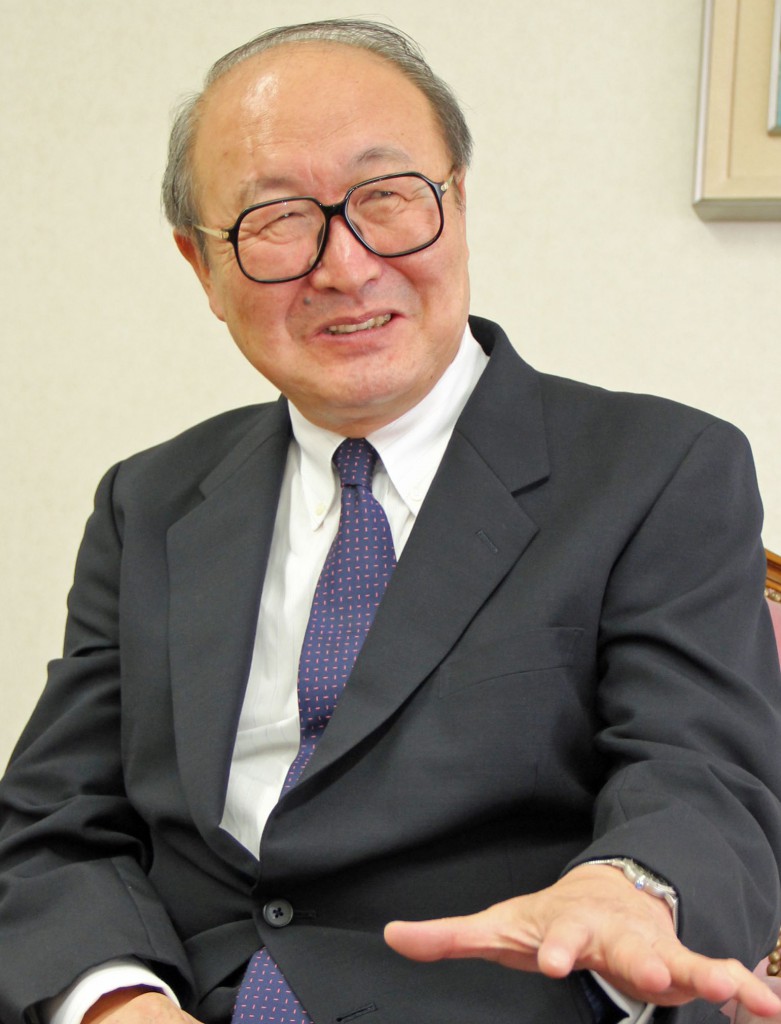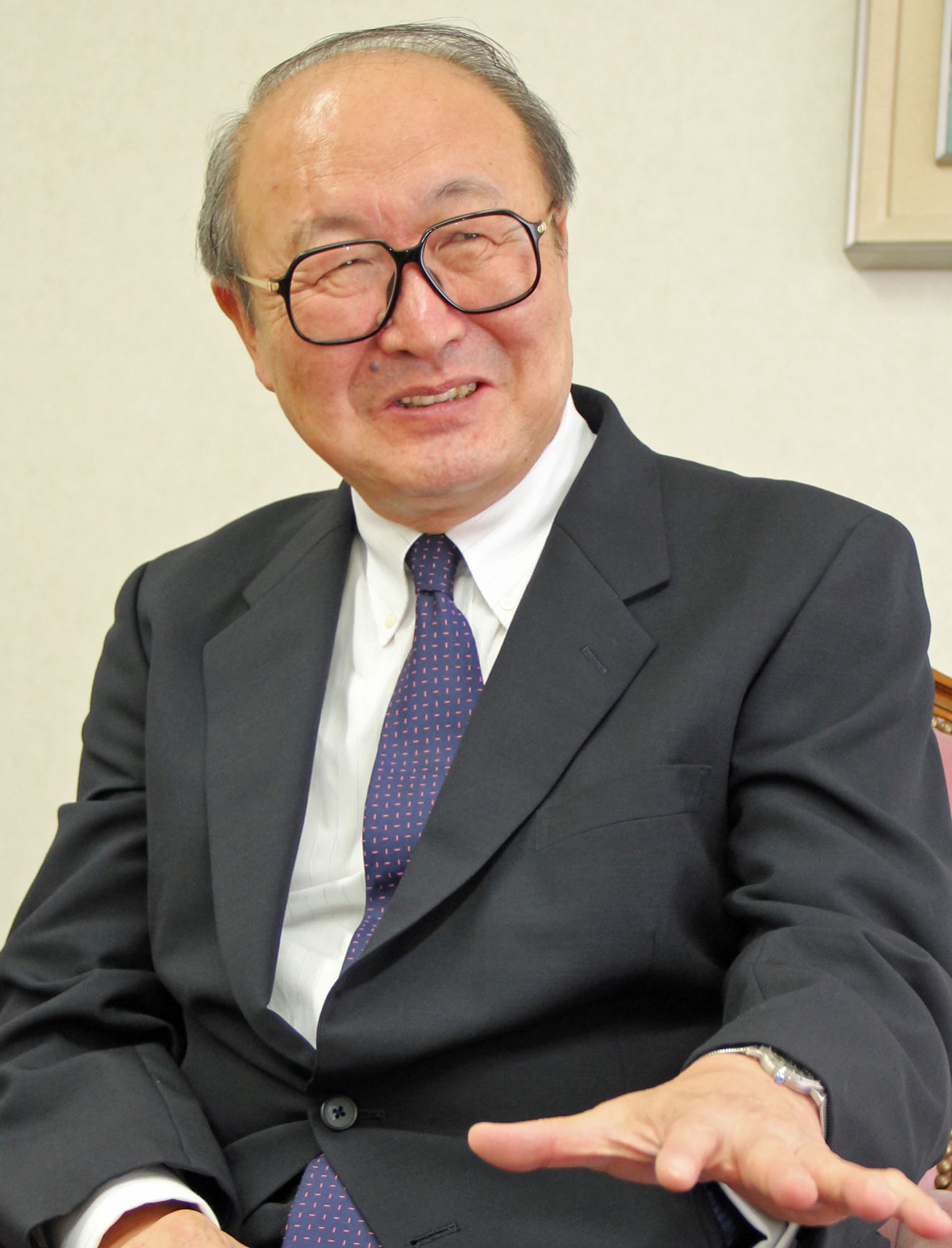“Media Training Needed for World-level Information Transmission” Mr. Hatsuhisa Takashima, Special Adviser, Japan International Broadcasting Inc.
Mr. Hatsuhisa Takashima, Special Adviser, Japan International Broadcasting Inc.
Mr. Takashima, 73, has held the posts of Representative of the Japan International Broadcasting Inc., Chief Commentator at NHK, Director-General for Press and Public Relations of the Ministry of Foreign Affairs, and other important posts; he has continuously been transmitting news about Japan. Mr. Takashima speaks on how information should be transmitted overseas and what roles the media should play.
-When did you realize the necessity of transmitting information?
As far as I am concerned, territorial issues. I was then the spokesman of the Foreign Ministry; Maybe I should have expressed Japan’s position on these issues more firmly. When it came to the Senkaku and Takeshima issues, no progress was seen, and the Northern Territories issue sometimes seemed to be making progress but actually didn’t. I know, the government of Japan is of the official view that there exists no territorial sovereignty issue to be resolved concerning the Senkaku Islands, but realistically speaking, Chinese ships are invading Japan’s territorial waters. So I feel very strongly that Japan should have made its point clearly to the world much earlier so that more people would have understood Japan’s position on the issue. It’s never too late to correct it and send out Japan’s position overseas, I’m sure.
-What do you think are the most effective means of transmission?
Where diplomatic issues are concerned, information transmission depends on individual “persons.” There have been only three Japanese whose essays were carried on “Foreign Affairs,” the globally-respected magazine on international relations. I understand that an essay should go through amendments before the editor says it’s ok. The writer should be very good at writing and also at communicating with the editor before his/her essay will be read by authority figures of the world. Likewise, we rarely see a Japanese name in the “views” page of the International Herald Tribune. I feel that it should become not a specific but a routine event that we see Japanese people appear on major TV programs or their byline articles carried in prestigious magazines and newspapers in the world. When I was the Foreign Ministry spokesman, I appeared in a BBC program called “HARDtalk.” I had an altercation with the interviewer. It was really a cold sweat experience, but after that, I was invited to appear on other TV programs all over the world and was surprised to find how popular that BBC program was. I was under a barrage of sharp questions off the cuff; I felt that we should have many people available who have much experience in standing up to such an interview and expressing their views clearly. What is important is putting it into practice. I think it is necessary to find people who have such a good command of English that they can write columns on a regular basis and make sharp comments on current issues.
Increase your intellectual capacity and speak out!
-What roles does TV play?
I am sure TV is still one of the core media. Some people predict that the Internet will be a mainstream for information transmission, but the basic information itself should be provided with carefully chosen words that are compact and easily understandable. Those with a solid reputation — seasoned journalists, scholars and commentators — should provide such information. At the same time, I am aware of the importance of the Internet, of course. U.S. experts on corporate communications point out that websites of Japanese firms are poor both in content and in English, that updating them is too slow and that if they could improve their websites, their positions in the world markets would be better. The same applies to the websites of the media and the government ministries and agencies. They should make efforts to boost the attractiveness of their websites, by, for instance, increasing video files, translating pages into other languages as quickly as possible, and offering summaries of the pages.
-In Japan modesty has been a virtue
I have attended many international conferences and symposia. When I first attended such a conference, I learned that putting up your name plate was the sign asking for permission to make a comment. It often happened that I was a little late in putting mine up, and when my turn came the focus of discussion had moved to another topic. There are a lot of techniques to get through international conferences; refine what to say according to the occasion, or when you start, refer to the comment of the speaker before you and then gradually change over to what you want to say. To master these techniques, you have to practice.
You study hard, keep training, and have as many as possible intellectual warehouses and cupboads, then you can have your say in international conferences. If you say, “Silence is golden,” or “Better leave it unsaid,” you will get nowhere. The more Japanese take part in international forums, the stronger Japan’s global assertiveness and say will get.
Learn the rules by media training
-What should we be careful about when transmitting information?
Media training is very important. When you have interviews with or speak to the media, or make a comment at an international forum or symposium, you should follow certain rules. There are a lot of media-training websites in the U.S. and the U.K. The common denominator is that there should be no off-the-record remarks. What you say will be reported somewhere. Don’t say “No comment,” either. They think you are hiding something. It is regarded as extremely dangerous to face the press corps in a free-talk session with no preparation. You should get everything sorted out in your brain and take responsibility for what you say. In Japan, however, people make such blunders very often. It is also important to transmit what you want to say concisely and clearly. Make preparations and a person with technical know-how does the announcing. If a question is beyond your own field of knowledge, let someone else answer. You should recognize your own territory and transmit information within it. Unfortunately, press briefings and press conferences after the Fukushima Daiichi nuclear accident were criticized as performed badly. “The government is in the position of pursuing responsibility, but it has conducted press conferences, getting help from the Tokyo Electric Power Co., Inc., the company to be pursued,” Martin Fackler, Tokyo bureau chief of The New York Times, criticizes. “Japan’s journalism having too cozy relations with big firms is another problem,” he continues. If the Japanese media immediately get rid of their bad habit of conforming too much to the party that they cover, forgetting a critical spirit, and then they could be global-level journalists. On the other hand, such information providers as the government, companies and politicians should learn how to transmit information globally and put it into practice. For that purpose, media training is most effective.
-What themes do you think we should transmit overseas?
“NHK WORLD,” an international broadcaster, introduces a unique company in Japan once a month. Japan has many companies that have a history, creativity, highly-qualified human resources and teamwork. Now the world attention in on China, but we should let the world know with confidence that, as a matter of fact, it is Japan that has real strength in Asia, that has been working hard to come up with something new and that is contributing to the future of mankind. The program has had many responses which indicate that Japanese teamwork for producing products and the sense of responsibility of individual workers seem to be spectacular to people overseas.
-What do you expect of FPCJ?
I highly appreciate the press tours. Participants have written very good articles. I think press tours offer very good opportunities for foreign journalists to take a good and slow look at Japan. I hope press tours will be run more frequently and visit many more places. I recently visited Hokkaido. While the farmers are pessimistic about Japan’s participation in the TPP negotiations, the opening of a charter flight between Bangkok, Thailand, and Shinchitose is gathering momentum. An Australian outdoor sports expert says that he can experience anything in and around Tokyo and that Japan is paradise. If foreign journalists find Japan’s local communities interesting and cover them, the local people who are covered will be encouraged. Synergetic effects might give rise to new chances. Japan is rich with a variety of nature, the four seasons and hot springs. If these were to be known to more foreign people, the number of tourists to Japan would increase dramatically.
(Interviewed by FPCJ President Kiyotaka Akasaka)
Mr. Hatsuhisa Takashima
Born in 1940 in Tokyo. After graduating from the Political Science and Economics Department of Gakushuin University, joined NHK (the Japan Broadcasting Corporation). Held positions of London Bureau Chief, Director-General of NHK News Department, Chief Commentator of NHK News Department. After retiring from NHK, assumed such posts as Director of the United Nations Information Centre in Tokyo, Press Secretary and Director-General of Press and Public Relations of Ministry of Foreign Affairs, and President and CEO of the Japan International Broadcasting Inc. Since 2011, Special Adviser, Japan International Broadcasting Inc.




